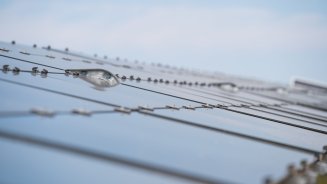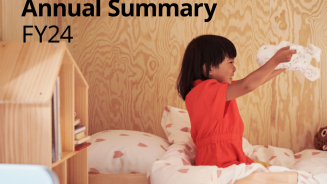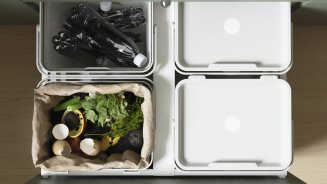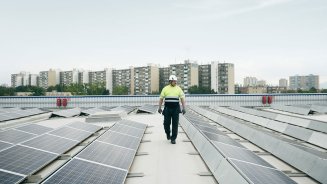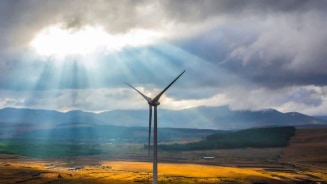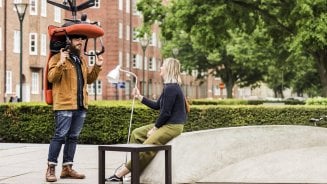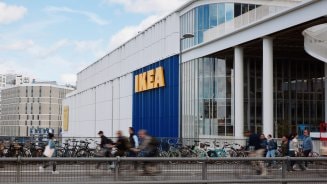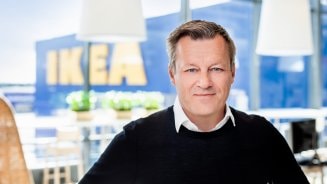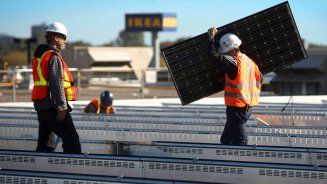During April and May Ingka Group is taking the next step in its circular journey and launching a new campaign to promote and inform customers on how to care for and pass on IKEA products when they no longer need them. Building on the success of its Buyback services, the campaign, entitled ‘Keep good things going’ will be an opportunity for IKEA retail countries to engage with customers and remind them of the different services available online and in their local IKEA store, which are designed to help enable more circular practices. The campaign highlights the IKEA Buy Back Service and the As-Is areas and will include several countries holding Flea Market events outside stores.
"For several years, we have offered services such as buying back products that are no longer needed, tidying up and reselling pieces returned to us, and providing assembly parts, so that your furniture can last longer. These services are all about making it easier and more convenient to make IKEA products last longer. This campaign is an opportunity for us to continue to inspire and raise awareness of these services, which we offer all year round, and to “keep good things going”. We want to reach new customers who may not be aware of these services, and maybe they start thinking in a more circular way when it comes to their old piece of IKEA furniture."– Karen Pflug, Chief Sustainability Officer, Ingka Group
In its latest sustainability report, Ingka Group reported 32.5 million products were sold in its As-Is areas during the past financial year*, with 1.8 million customers using its assembly parts** service to repair and extend the life of IKEA products. To improve accessibility to second-hand products and enable more customers to use the As-Is areas, it has now been launched online at 219 IKEA stores in 21 countries.
Ingka Group continues to explore how to best reach its ambition to become a circular business and is testing a range of solutions. These solutions include repurposing As-Is areas, where, as well as continuing to be able to pick up products at a lower price, there are secondhand products, and information about maintaining, cleaning or personalising IKEA products.
“We want to inspire our customers to prolong the life of products that they don’t use anymore by arranging flea markets in the parking lots outside all our 20 stores in Sweden during May. By doing this, together with the services we offer all year round, we want to help customers get the best value out of products for the longest possible time, which is better for their wallets and for the planet”, says Johanna Nordell, Country Sustainability Manager at IKEA Retail Sweden.
As part of its climate commitments, IKEA is committed to becoming a circular business by 2030 and it wants to play its part in making the circular economy a reality. As the largest IKEA retailer, Ingka Group is exploring how it can best contribute to this shift, including enabling its customers to take part in more circular practices, and collaborating with stakeholders, including government policy makers to support policies that promote the transition to a circular economy, where the ambition is that resources are continually reused, regenerated, and eventually recycled in an unnecessary way.
“At Ingka we firmly believe we can – and should – play a role in promoting the transition to a circular economy and accelerating actions by advocating and positively influencing the private sector and governments”, Karen Pflug concludes.
“While we are continuing to explore how to make circular products and services accessible and affordable for our customers, there is still a major shift needed in society and business to make circular economy a reality. As we continue to invest, test, and develop new business models, we also need support from governments and organisations like the EU, to bring in new policies that support businesses, for things like better waste collection and waste management infrastructure,” she says.
————————————————————————————————————————————————————————————————————–
POLICY BARRIERS – IKEA is proactively engaging with policy makers around the world advocating for removing policy barriers to enable a more circular economy. Specifically, we strongly support the European Union Circular Economy Action Plan and hope that by offering more circular products and services IKEA will positively contribute to the ambitious European agenda. IKEA is asking the European policy makers to consider the following policy asks to help drive change towards a more circular economy for businesses:
- Set internationally harmonized common definitions and metrics for circularity aspects. The concepts of ‘waste’, ‘reuse’, ‘refurbishment’, ‘remanufacturing’, ‘recyclability’ and ‘repairability’ need to be more clearly defined at EU (and international) level to create a level playing field. What you cannot measure, you cannot manage.
- Optimise waste collection and waste management by improving separate collection and harmonizing extended producer responsibility schemes (EPR) across the EU for all product and material categories. Additionally, minimum transparency standards for EPR scheme administrators on their effectiveness to follow the waste hierarchy should be introduced.
- Secure incentives for prolonging product and material life. These include economic incentives, such as reduced VAT on repairs and second-hand purchases, or fiscal measures aimed at making secondary raw materials more competitive than virgin ones which would make circular business models more economically viable. Reduced taxes on services and labour, or other types of incentives for these activities will also be beneficial.
- Create a true single market for secondary raw materials by removing administrative barriers when shipping waste to recycling facilities within the EU. When possible, “excellence centers” for recycling could be also shared across-countries, reliant on simplified waste shipment rules.
- Support investments in better waste treatment infrastructure and capacity building in order to meet the growing demand for recycled content.
Related links:
- For more information and if you want to know more about Ingka advocacy, please click here: Climate change advocacy
- Ingka Group Reporting – Better planet | Ingka Group
- Transitioning to circularity impacts everything we do (ikea.com)
*The financial year 2021 (referred to as FY21) of the Ingka Group (Ingka Holding B.V. and its controlled entities) refers to the period between 1 September 2020 and 31 August 2021
**Assembly parts include screws, bolts etc., the parts required for assembling items. Furniture spare parts refer to replaceable parts of an item such as drawer fronts, table tops etc. and other parts for electrical items e.g. cables.
About Ingka Group
With IKEA retail operations in 31 markets, Ingka Group is the largest IKEA retailer and represents about 90% of IKEA retail sales. It is a strategic partner to develop and innovate the IKEA business and help define common IKEA strategies. Ingka Group owns and operates IKEA sales channels under franchise agreements with Inter IKEA Systems B.V. It has three business areas: IKEA Retail, Ingka Investments and Ingka Centres. Read more on ingka.com.
Media enquiries
For further information, journalists and media professionals can contact us at press.office@ingka.com or by calling +46 70 993 6376.





